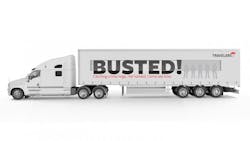For the first time, insurer Travelers brought its Sting Trailer crime-busting tool to the American Trucking Assns.' safety, security and human resources gathering last week and gave attendees tours. Fleet Owner caught up with Travelers transportation crime and theft specialist Scott Cornell to hear the latest on cargo theft — and five reasons why it has many in the freight and distribution business concerned.
1. It's a very big problem.
The scope of cargo theft in the United States is broad and extensive. "It's a much bigger cost than people realize," Cornell says. The FBI places the annual economic toll cargo theft takes somewhere in the range of $15-$30 billion, he adds, depending on how you count, which is more than auto theft or all employee theft at the workplace.
Why such a range? Cargo theft is often reported under various crime codes, Cornell explains, and there's debate about how you tally it up.
"Is it just the cost of the TVs on a trailer that were stolen, for example, or is it that cost and the cost of replacing them — manufacturing them again, reshipping them, the value the store lost by not having TVs on its shelves?" he notes. "How much did 'company A' lose by not having those items in a given week when their competition did?
"There are all sorts of costs associated with cargo theft," Cornell says, which makes exact figures difficult to pin down.
2. No matter where or when it happens, the crime essentially can be invisible.
Even if it's taking place in broad daylight and right under people's noses, chances are good they might not even notice.
"How many times have you pulled into a shopping mall and seen a tractor and a trailer there in the parking lot?" Cornell muses. And the obvious answer could be any or every time — as the distribution method for about four out of five goods or packages to stores across the nation, trucks and trailers frequently, if not nearly always, go hand-in-hand with shopping malls, storefronts and other places of business.
As a result, it'd be quite normal to see a truck pull up to a trailer, hook up and pull away, even if a particular instance of that happens to be cargo theft.
Alternately, cargo theft can take place out of the public's view in areas like industrial parks where trucks are picking up and dropping off loads or in dark lots where tractor-trailers are parked for the night. And in that case, it's simply "out of sight, out of mind" when it comes to being noticed.
"Cargo theft is one of those things where it affects everybody, but you don't see it or necessarily feel it up front," Cornell tells Fleet Owner. "And you don't realize when you buy that TV or cell phone that there may be some cost associated with cargo theft in that purchase — you just see it as the cost of the item."
3. A worrying new trend has been emerging.
There've been several major trends in cargo theft, Cornell notes, and the nation may now be facing another.
Following the economic calamity of 2008, he says cargo thieves began to shift from high-dollar items like electronics and target more food and beverage items — things like nuts, energy drinks and frozen meats and seafood. "I kind of joke that cargo thieves are good capitalists. They understand that if they steal it, they have to be able to sell it," Cornell contends. "People didn't have the extra money for expensive electronics." And there are other benefits: if you steal food and beverage items, the evidence tends to be consumed and disappears quickly.
Then around 2011 and 2012, another trend was that cargo thieves began to commit less straight cargo theft — you pull up to a standing trailer and haul it off on the sly, for example — and more strategic cargo theft. Straight cargo theft is still most common, but strategic cargo theft includes things like identity theft, fraudulent carriers and fictitious pickup.
"With identity theft, somebody poses as a legitimate trucking company, books freight, picks it up and then disappears with it," Cornell says. "Everybody eventually realizes what happened, and it's a scramble to try to figure out where the load went."
With fictitious pickup, thieves find out about a load to be picked up by a legitimate trucking company, "and the classic example is that they show up a couple hours early and say, 'Hey, here's our paperwork — we got here a little early. Can you load us up and get us out the door?'" he explains. A key point with identity theft or fraudulent carrier crimes is that there's more contact with the criminals and more of a potential trail of leads to investigate, Cornell notes, whereas you don't have that with fictitious pickup.
Now the latest trend: cargo thieves are taking to more advanced technology. "We've seen more involvement with cybercrime. We've seen thieves use 'sniffers' to find covert tracking devices in trailers and jammers that take out tracking devices, so they can steal the cargo even if you have a tracking device in there," Cornell says.
And for a new twist, how about 3D printers? "We've seen the use of 3D printers to duplicate seals," he adds. "They can break a seal on a truck, take out part of the load, and then create a duplicate, fake seal with a 3D printer to close the trailer back up. So we're seeing a solid increase in the use of technology."
4. By nature, cargo theft is attracting more intelligent criminals.
Some criminals are just plain stupid, and that makes them easier to detect and catch. Unfortunately in that regard, cargo theft actually offers a lot of "perks" and tends to attract the thinkers, and here's why.
Not only has there been the increase in technology involved as noted in No. 3 — which indicates cargo thieves are often a more sophisticated, savvy bunch — but cargo theft has a nice, low overhead.
Even with lower-value loads like stolen foods and beverages, "it can be a good 'return on investment,' if you look at it that way," Cornell explains. "Or let's say you get a load of electronics worth $500,000 and you can sell it for $200,000-$250,000, maybe even $150,000, depending on how quickly you want to move it.
"Keep in mind, that's all profit. It's not like cargo thieves have a storefront," he continues. "So even if they sell a $500,000 load for $150,000, their profits could be through the roof."
And this isn't like Wild West train heists: cargo theft today is also, by and large, nonviolent. "Depending on what numbers you read, less than 2-3% of cargo theft in the U.S. involves violence," Cornell notes. "So you have a high-dollar crime with a large take, a high profit margin, and you don't have to be violent to do it.
"There's so much freight just sitting out there," he adds. "So if I'm a bad guy, why would I want to increase my chances of going to jail for a longer period of time? I'll just take the stuff I can get easily, and if I stay away from violence, even if I do get caught, I won't have all those mandatory minimum sentences that go along with violent crimes."
5. It's not just the holiday season anymore.
Even recently, trucking companies, shippers and others in the distribution business could expect more of a seasonal nature to cargo theft. But those times may be a-changin'.
"It used to be pretty consistent: from Sept. 1 on, we would start to watch cargo theft tick up. It was kind of fourth quarter, Christmas cargo's on the move," Cornell recalls. Expecting a surge, investigators and law enforcement would "get geared up and get ready for it," while companies involved in distribution "would kind of brace themselves and be ready to answer that phone quickly," he notes.
That's begun to change in the last two years or so. "It's been less consistent. It still goes up and we still see an increase in thefts, but what we've ended up seeing is more targeted increases — maybe we'll see more alcohol stolen around the holidays, maybe some more video games and video game consoles, things like that," Cornell says. "So we still see an uptick, but it seems like cargo theft is kind of leveling out more across the year. We're not seeing the peaks and valleys we used to see."
And while that doesn't mean there won't be a spike in cargo theft this holiday season, Cornell notes, the takeaway for fleets, trucking companies, shippers, freight brokers and others is this: You need to be vigilant not only seasonally but all the time for cargo theft, and the criminals you're facing are often very clever and adaptable.
There may be things you can do to give yourself an advantage. Travelers is the only insurance company to have a dedicated cargo theft unit, according to Cornell, and it's been in operation and growing since late 2004. The unit works with law enforcement to find and eliminate cargo theft rings and recover stolen goods, and also works with Travelers customers to train them on the best ways to prevent thefts from happening.
"We have this dedication with our special investigative group and our knowledge and expertise behind this. We think we give you an advantage; we think we bring an extra level of capability to our insureds," he contends.




